- Home
- Cherie Priest
Jacaranda
Jacaranda Read online
Jacaranda Copyright © 2015 by Cherie Priest.
All rights reserved.
Dust jacket illustration Copyright © 2015 by Jon Foster.
All rights reserved.
Print version interior design Copyright © 2015 by Desert Isle Design, LLC.
All rights reserved.
Electronic Edition
ISBN
978-1-59606-685-4
Subterranean Press
PO Box 190106
Burton, MI 48519
www.subterraneanpress.com
The nun’s letter intercepted Juan Miguel Quintero Rios on the road to Port Bolivar. Her handwriting was small and precise, and easy to read—even in the back of a bouncing cart on a rough-paved road made rougher by the lunging wind. No natural-born American, that one. Irish, the padre guessed by her name and her habit. What she was doing on the Gulf was anyone’s guess, and how she’d learned of him, he did not know; it was the only question she left unanswered in her carefully composed response.
He did not care, but he was curious.
Despite that one omission, her small bundle of papers contained a wealth of new information. At first she’d told him only that the hotel hated, and it hungered. Now, in this most recent message, she told him the rest.
In 1878, a cattle baron by the name of Jack Darnell had bought the property and its surrounding acreage, hoping to build a resort that would rival any in Houston—or even the great estates of the Caribbean. But his plans were hotly resisted by the locals, for in order to create this “castle on an island,” a landmark must be destroyed.
On the site of the proposed hotel, a blue jacaranda bloomed.
No one knew for certain why the tree was planted there, or who had installed it on the island—though someone must have done so, for it was not native to the region; and it was quite ancient by any standard. Alas, the original gardener had long since passed, leaving no real clues behind.
But one rumor had attained the status of a fairy tale, short and sad: A conquistador loved a woman, and that woman had loved the jacaranda. When she died, he planted this one in her honor, if not her memory—for not even the most dedicated listener or oldest island resident knew the woman’s name.
And after all, that was only a rumor.
(Though it might have held a grain of truth, it just as likely didn’t.)
Regardless, the tree was greatly beloved. For as long as anyone remembered, it had been a favorite place for lovers to meet and children to climb. Its trumpet-shaped flowers cascaded in clusters of purple-blushed indigo; over the years they’d been woven into the braids of a thousand maidens, and offered in a thousand gestures of romantic intent. They were gathered into bouquets for weddings, and laid upon caskets as sweet farewells. To be sure, there were other flowers on the island, but none compared to these.
All the same, ground was broken for Jack Darnell’s hotel.
And likewise was the tree.
People came from every corner of the island to witness its destruction, not with the morbid glee of those who attend a hanging—but with the sorrow of a loved one’s wake. It was said that one last blossom was taken in the end, and pressed between the pages of a Methodist minister’s bible…as a reminder of the wickedness that men may do.
Wicked or only ambitious, Darnell constructed his castle.
He never gave a second thought to the tree; in fact, he had never set eyes on it in the first place.
Whereas the tree had been living, lithe, and sprawling, the hotel that replaced it was a blocky, almost manly affair—built in a style just ahead of its time, or so Darnell was assured by his architects. Its symmetry was clean and precise, and its lines stopped short of being austere, for there were touches of art at the corners, and details of refinement along the ivory plaster and red bricks, the graphite shade of the cornerstones and the wood-framed windows, with their narrow sills and shutters the color of rust. Inside, the floors were set with clean, dramatic mosaic tiles in sharp white, black, and green; and the fixtures were mostly brass that had been polished until they gleamed like mirrors.
It spoke of wealth without too much ostentation, and quality without excessive frivolity. All in all, it was a restrained place for a man with so much money and such grandiose plans, but his wife might have been the guiding, stabilizing hand in that matter.
In the end, the hotel was given her name. They called it Odessa’s Court.
The padre wondered what sort of name “Odessa” was, and where it might have come from. Perhaps he’d ask when he arrived, and maybe someone would know.
A gust of wind tugged at the letter; he held its pages tightly until the bluster passed. Above, the sky was going pale, all the blue washed out of it. A storm was coming. Or rather, he was coming toward a storm.
He read on, picking up the tale on the next sheet.
The millionaire and his bride were the hotel’s first two victims.
Jack Darnell was found hanging in the lobby, dangling from one of the new-fashioned fans with tracks that snaked along the ceiling. Though dead, he moved slowly, back and forth across the room, drawn along by the ratcheting chain—his feet dangling ten feet off the floor. Odessa Darnell lay face-down on the ground beneath him, her skull shattered against the tiles by what must have been a terrible fall from the second story landing.
The Texas Rangers called it a double suicide. The case was closed, and in the wake of three more deaths in the span of a month…so was the hotel.
For fourteen years it sat empty, until it was purchased by a private investment group in San Antonio. A manager was sent out to assess the property, and upon his approval everything was cleaned, renovated, and re-opened under a new name: the Jacaranda Hotel, after the long-gone landmark.
The nun suggested that this was a canny move, or else a superstitious one. It would seem that they hoped to appease whatever unhappy thing had taken up residence there.
At any rate, according to Sister Eileen, the former republic (and now mere state) of Texas was sending a Ranger to investigate, or so it’d vowed—but no such man had yet arrived. In all frankness, she did not expect her request to be taken very seriously by anyone in Austin. It was too hard to frame the problem while leaving out all the stranger, stickier bits. She had to tell them that people were dying, yes. She was compelled to admit they died by storm, by suicide, by accident, and by coincidence: almost two dozen of them, in singles and in clusters. She was bound to confess they’d been unable to uncover any murderer, or even any plot of murder.
She requested their intervention all the same, with all haste, before the tally of dead could rise any higher.
But she knew—she believed—she could tell the padre everything else…the whole truth, so help her God. Even if Texas would not answer, he might.
He finished her letter a full hour before he finished his journey, arriving at Port Bolivar just as the first spits and hisses of rain began to fall. The sky was still white, the curdled color of milk on the verge of turning.
The grain driver dropped him off at the pier, where they parted on friendly terms. The padre was grateful for the ride. The driver was grateful for having shared a confession so minor, that it was a wonder it’d weighed upon his heart so heavily, and for so long.
With a round of thanks, the padre set off for the ferry.
“You’re a madman, you know,” the driver called out as he cracked the reigns to get his horse’s attention. “Everyone with any sense is leaving Galveston, before it’s washed away.”
The padre roamed freely along the small ferry’s deck. He avoided the maintenance men and the wheel operators, the carts stacked with seeds and flour and other supplies, and the soft stampings of anxious horses who’d much rather swim than float. He did not need to avoid the other passeng
ers, for there weren’t any.
At first he paced, back and forth from stern to prow beneath the overhang to keep himself and his satchel dry; and then he settled on a quiet spot where he could watch the Gulf in peace. It did not quite churn, but it rumbled, and its low waves were frothed with spittle. The water was as gray as the sky was white.
Finally, a long line of land came into view: a shadow as thick as the width of his finger, then his thumb, and then he could pick out the details—pale strips of sand, clusters of trees, great fluffy tufts of sea oats fattening the banks at high tide.
As the ferry drew up close to its pier, Rios saw the men who worked the simple dock with its accompanying row of warehouses and businesses. Big-shouldered fellows lifted crates alone, or with the help of others; well-dressed women observed from a deck up above the water, pointing and whispering behind gloved hands. Dogs barked, greeting the incoming craft. Cats hung closer to the fishing boats and small pools left by the receding waves, trying their paws at crab-catching and shrimp stealing—all the while competing with circling bands of chattering seagulls, hoping to snatch their own meals from the water or the shore.
The day was warm, but not unreasonably so for May—and the ocean breeze blew damp and chilly with the not-quite-rain when the craft was tied into place, a ramp dropped down onto the deck, and the padre was allowed to arrive.
Everyone else was leaving.
As soon as he’d descended the ramp, Galveston residents climbed it. One by one they boarded the ferry and dropped their fares into the captain’s box; and one by one they stepped onto the wet, sun-bleached boards of the dock.
The padre had never been to the island before, but he knew it wasn’t large. He had a map, borrowed from a friend back in Houston, and the map had precious little upon it—save a half dozen streets, a park or two, and a notation with regards to the churches, a convent, and a prison.
The Jacaranda Hotel was marked with a penciled-in “x.”
He set off on foot. The distance wasn’t more than a couple of miles, and he was ready to move his legs after all the riding and sailing. Besides, the scenery was pleasant, the rain was mostly holding off, and the roads were not so bad. Some stretches were paved, and some were long expanses of chalk-white sand and gray-swirled dirt, pocked with little wads of tar that washed in with the ocean.
There was no sun, but the air was tangy, familiar, and welcoming.
Not so the Jacaranda Hotel.
It wasn’t visible through the trees, and indeed it was utterly concealed until he stood directly before it; there were only three stories, and the roof was flat—in the tradition of places that fear the shearing forces of an occasional hurricane. The structure was not precisely squat but long and blocky, brick and plaster, with hints of imported stone. It was made of reds and whites that had faded under the coastal sun, and now appeared to be browns and creams.
Two oversized doors made of carved oak waited beneath a great black canopy, up a short series of stairs.
Juan Miguel Quintero Rios stood still, and listened.
Gulls shrieked greedily back and forth, squirrels scurried and scattered, and shorebirds called their softer, sweeter calls back and forth to one another. Out on the water a loud, low whistle blew, so another ferry was either coming or going, signaling to the lighthouse at the island’s southernmost point.
He listened harder.
Under his feet the sandy earth shifted as moles, rats, and snakes cut their passages from place to place; the men at the docks dropped freight as heavy as mules, rattling the pier and startling the stray cats. Beyond the far edge of the horizon, clouds whispered against each other, coiled up, and collected together. Butterflies flapped their feather-light wings and dusted the bright pink azaleas.
He closed his eyes.
Bricks settled and shifted, cornerstones grumbled. The great oak doors swelled and shrank in their frames. Below, much farther down than the oil-specked sands or the paved, angled walkways that flanked the hotel and led to its gardens, something enormous and very dark rolled over.
It turned, restless as a fevered sleeper. It did not breathe or whisper, but it moaned. It hummed. It growled.
***
He opened his eyes. Snapped them open, only to narrow them again at the curved black canopy and the doors beneath it.
“So there you are,” he said.
But nothing answered.
The padre adjusted his satchel, sliding the strap up higher on his shoulder. Despite the breeze and the damp he was warm from the walk, and a bit uncomfortable though there was no sun to bake his black cassock (which was only made of cotton, anyway).
He put one foot forward, and felt only a very slight, very faint resistance…so he took another step. Feeling resistance there too, he pressed harder next time. Kicking against something thick and unwilling, below the earth itself. Left foot, right foot, pushing against whatever waited inside, underneath.
Against whatever did not want him there.
By the time he reached the steps, he was almost smiling. The hotel would have to do better than that, if it wanted him gone. The growl and the unwelcoming start did not frighten him. They only told him how much attention he ought to pay, and how frightened he might wish to be later.
But not yet.
The main door knockers were round and ornate, cast with decorative jacaranda blossoms at the top. A nice touch, he thought. He lifted one, then changed his mind and reached for the lever instead, opening the door to let himself inside.
The lobby was bright and clean.
A sweeping pair of staircases made a statement and an arc, leading to a mezzanine at the top, from whence the late Mrs. Darnell had no doubt fallen some years ago. The padre looked up at the ceiling and saw the fans turning, roaming on their tracks. Three at a time on each side of the room, trundling back and forth like toy trains, to keep the air moving. Their chains clacked together like teeth.
Yes, this was where the Darnells had died.
But when he listened, he heard only a stain: a gargling sound and a crash, and the dribbling noise of blood collecting into a pool. He did not hear any anger, any hatred. He heard no murder, only death.
A great desk and a long counter awaited him along the far wall, and behind them was a mirror—the sort he’d seen behind bars, in the occasional saloon…back when he’d frequented such places. It had been awhile, but not so long that he suspected the style had changed.
In the mirror he met own eyes, and then he looked elsewhere.
He saw a young woman in a crisp blue dress, ready to hear his name and give him a room if he’d only sign the guest book and arrange his payment. He saw the fans running along the ceiling, performing their mechanical ballet back and forth, back and forth. He saw the gleam of the floor and the fixtures, and an elevator he hadn’t noticed at first.
He looked harder.
There was a blur, a flash of arms and legs and blood, falling. Crashing. Falling again, in a cycle as true as the fans above him. No sound at all. Only the shape, the impression of flailing and fear, horror and the quick, messy shine of brains on tiles. And up there, another shadow. A smudge with less definition than a thumbprint. Riding along the tracks, keeping company with the roving, mindless fans.
He blinked. He blinked again, scrubbing the images away.
The young woman behind the counter smiled at him. “Can I help you?”
He stepped forward and placed his satchel on the floor beside his feet. “I would like a room.”
“Very good!” she exclaimed. She was surprised, but glad. And something else, but he wasn’t listening hard anymore, so he couldn’t tease it out. “How long will you be staying with us? A few days at least, I should think—until the storm has passed. I don’t think it will be too bad, but you never do know.”
“I hope you are right. And yes, I will stay a few days.”
All of this in English, for nothing about the woman suggested she knew a word of Spanish. His words vibrated softly with a
n accent, but he was easy enough to understand. Only the occasional fool pretended otherwise.
When he gave the girl his name, she made another small exclamation: “Oh! I have a message for you. It’s from Sister Eileen. She said you’d be joining us.” From under the desk she retrieved an envelope, folded but not sealed. It said “Father Rios” in handwriting he now found familiar.
He thanked her, but he did not open it yet.
The woman, whose name was Sarah, gave him a room key in exchange for three days’ worth of board. She retrieved a paper sign that said, “Back in 5 minutes.” She took him to the elevator and drew back its cage. She stepped inside, inviting him to do likewise.
“It’s a new addition,” she explained. “The owners had it installed a month ago. It’s lovely, don’t you think?”
“A fine device,” he agreed. Its buttons were glass, and indicated the three visible floors as well as a basement. The floor was tiled with large black and white squares of linoleum that felt firm but spongy when he bounced slightly on his heels. A glass bulb in a metal cage cast out light from a vivid yellow filament; it flickered when the girl pulled a lever, and the lift began to rise.
“You’ll be on the third floor on the north wing. Same wing as Sister Eileen, though she’s on the second floor. Shall I tell her you’ve arrived?”
“No, do not bother her.”
The elevator climbed smoothly, and when the third level landing presented itself, Sarah pulled the lever again—lining up the floors for a seamless exit. “As you like. Please, make yourself comfortable. If you need anything, I’ll be downstairs. Or you can ring from your room,” she told him. “The bell will bring me or one of the Alvarez ladies, right away.”
“Thank you, but I have had a long week’s journey. I will need some rest, and to refresh myself.”
He did not intend to rest, but he did not want the young woman’s company, either.

 Maplecroft
Maplecroft Chapelwood
Chapelwood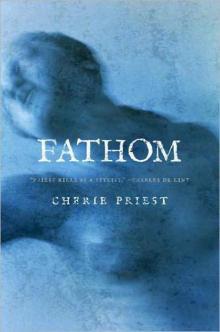 Fathom
Fathom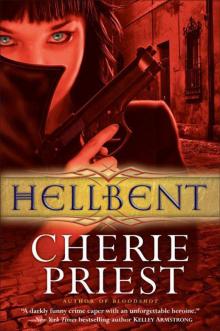 Hellbent
Hellbent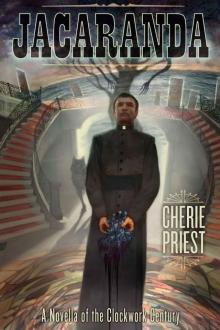 Jacaranda
Jacaranda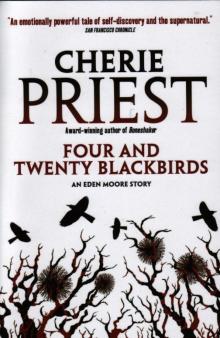 Four and Twenty Blackbirds
Four and Twenty Blackbirds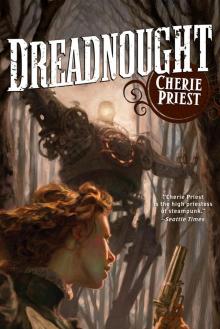 Dreadnought
Dreadnought Dreadful Skin
Dreadful Skin Bloodshot
Bloodshot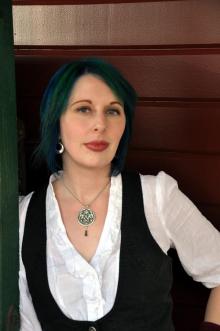 Tanglefoot
Tanglefoot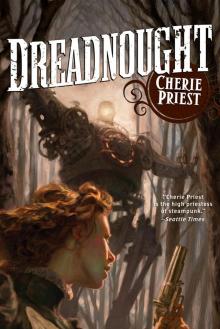 Clementine
Clementine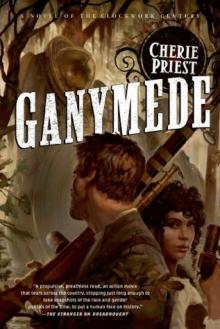 Ganymede
Ganymede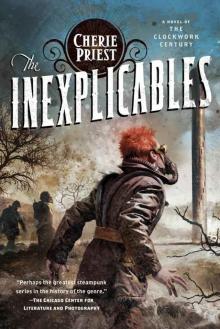 The Inexplicables
The Inexplicables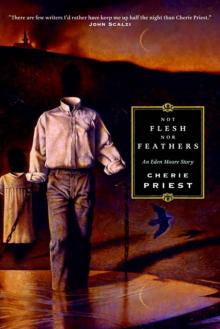 Not Flesh Nor Feathers
Not Flesh Nor Feathers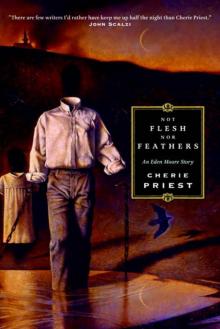 Wings to the Kingdom
Wings to the Kingdom Fiddlehead
Fiddlehead Tanglefoot: A Story of the Clockwork Century
Tanglefoot: A Story of the Clockwork Century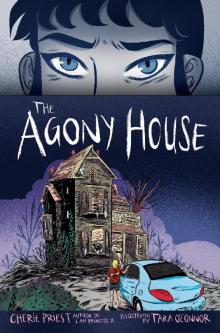 The Agony House
The Agony House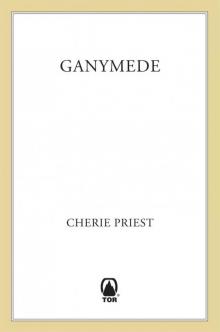 Ganymede (Clockwork Century)
Ganymede (Clockwork Century)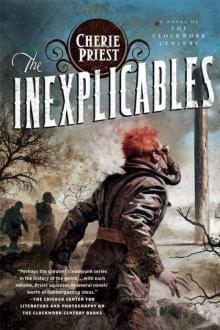 The Inexplicables (Clockwork Century)
The Inexplicables (Clockwork Century)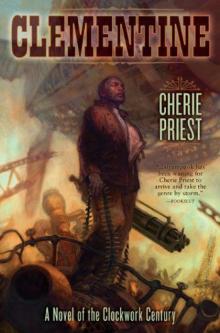 Clementine tcc-2
Clementine tcc-2 Grants Pass
Grants Pass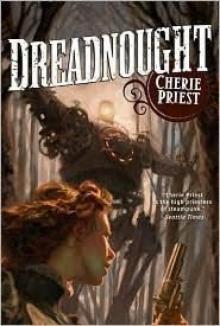 Dreadnought tcc-3
Dreadnought tcc-3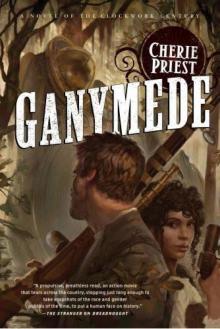 Ganymede tcc-4
Ganymede tcc-4